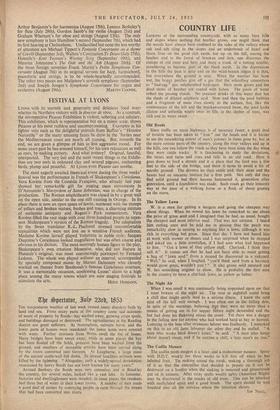FESTIVAL AT LYONS
LYONS with its warmth and generosity and delicious food over- whelms its Northern visitors with la douceur de vivre. As a contrast, the retrospective Picasso Exhibition is violent, sobering and salutary. This exhibition, which is representative but on a minor scale, shows Picasso at his most ruthless and uncompromising. Examples in his lighter vein such as the delightful animals from Buffon's "Histoire. Naturelle" or the many amusing fauns he.drew in the 'forties near the Mediterranean coast are nearly all missing. But, towards the end, we are given a glimpse of him in less aggressive mood. For some years past he has amused himself, for his own relaxation as well as ours, by making pottery. And what pottery! Original, fanciful, unexpected. The very last and the most recent things in the Exhibi- tion are two owls in coloured clay and several pigeons, enchanting birds, plump and peaceful. At Lyons even Picasso can soothe.
The most eagerly awaited theatrical event during the three weeks' festival was the performance in French of Shakespeare's Coriolanus, Vera Korene from the Comedie Frangaise, who already last year showed her remarkable gift for staging mass movements in D 'Annunzio's Martyrdom of Saint Sebastian, was in charge of the production. The Roman amphitheatre was closed in by a great wall on the open side, similar to the one still existing in Orange. In its place there is now an open space of lawns, scattered with the stumps of pillars and broken statues, bushes and trees, a charming mixture of authentic antiquity and Regent's Park romanticism. Vera Korene filled the vast stage with over three hundred people to repre- sent Shakespeare's version of the Roman tragedy. The adaptation by the Swiss translator R.-L. Piachaud stressed uncomfortable topicalities which were not lost on a sensitive French audience. Madame Korene herself played Volumnia in noble style; Jacques Daqmine's Coriolanus looked magnificent but was often coarse and obvious in his diction. The most movingly human figure in the play, Shakespeare's own creation Menenius, who. did not feature in Plutarch's original, was most convincingly portrayed by Fernand Ledoux. The whole was played without an interval, accompanied by specially composed music by Marcel Delannoy who cleverly worked on themes from Beethoven's famous Coriolanus overture. It was a memorable occasion, confirming Lyons' claim to a high place among the many towns which are now staging festivals to


























 Previous page
Previous page